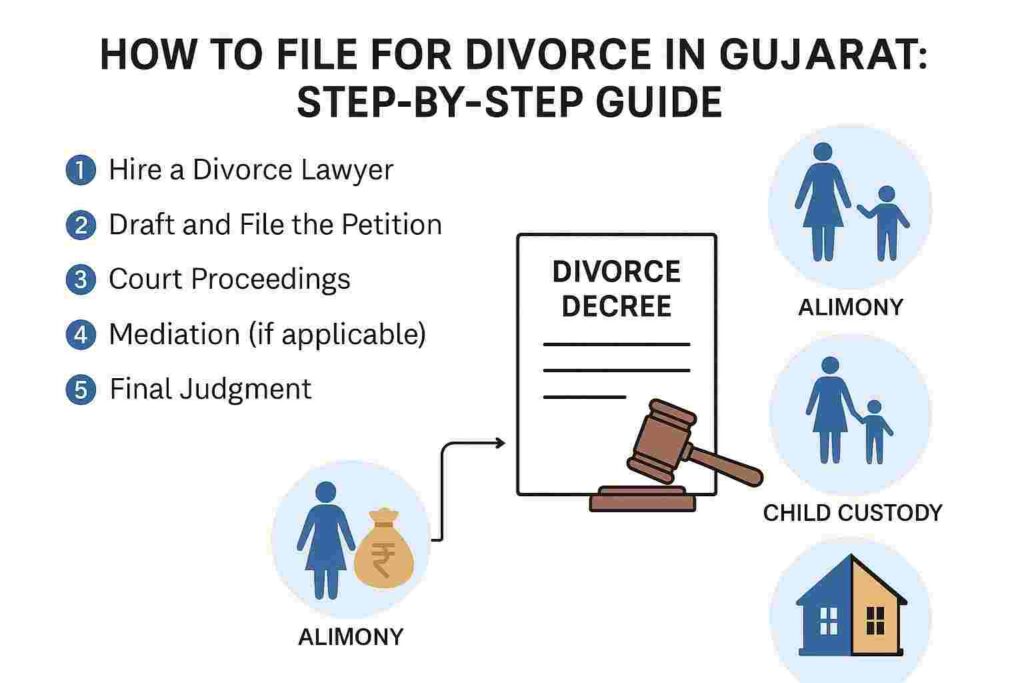
Considering divorce in Gujarat? This legal guide walks you through mutual and contested divorce procedures, court processes, and local lawyer options to protect your rights and peace of mind.

⚖️ Types of Divorce in Gujarat
Under Indian law, divorce can be pursued through two primary routes in Gujarat:
- Mutual Consent Divorce: Both partners agree to end the marriage peacefully.
- Contested Divorce: One spouse files on specific grounds like cruelty, adultery, desertion, or mental illness.
📋 Step-by-Step Divorce Procedure in Gujarat
- Hire a Divorce Lawyer: Choose an experienced divorce advocate near your city. Local options include:
- File the Petition: Your lawyer drafts and submits the petition in family court.
- Court Proceedings: Attend hearings, present evidence, and undergo examination.
- Mediation (If Required): Courts often refer couples to mediation before litigation proceeds.
- Final Judgment: On satisfying legal grounds, the court issues a divorce decree.
📝 Key Legal Considerations
- Alimony & Maintenance: Decided based on income, standard of living, and dependency.
- Child Custody: Courts prioritize the child’s best interests. Joint custody is increasingly common.
- Property Settlement: Can be decided mutually or by court depending on ownership and contribution.
📍 Local Family Courts in Gujarat
Here are key family courts where divorce matters are heard:
Ahmedabad: Near Income Tax Circle, Ashram Road
Surat: Athwalines, opposite District Court
Vadodara: Raopura
Rajkot: Nyay Mandir, University Road
❗ Common Grounds for Contested Divorce in Gujarat
- Domestic violence or cruelty
- Desertion for more than 2 years
- Adultery or infidelity
- Mental disorder (as medically proven)
- Conversion or renunciation of the world
📑 Divorce Papers: Key Documents You’ll Need
Filing for divorce in Gujarat involves several legal documents, commonly known as divorce papers. These documents formalize your intention to dissolve the marriage and include personal details, grounds for divorce, and supporting evidence.
- Divorce Petition: The main document stating the reason and type of divorce (mutual or contested).
- Address and ID Proofs: Required for both spouses to validate identity and jurisdiction.
- Marriage Certificate: A legal record of your marriage that must be submitted with the petition.
- Income & Asset Declarations: Helps determine alimony, property division, and child support.
- Affidavits and Statements: Sworn declarations related to cruelty, desertion, or other grounds in contested divorces.
Our divorce lawyers at Advocate Ace ensure that all paperwork is accurately prepared and filed to avoid unnecessary delays and rejections in court.
Role of Supreme Court and High Court in Divorce Cases in India
While most divorce cases in India are handled at the Family Court level, the High Courts and Supreme Court of India play important roles in special situations. Here’s how they are involved:
- 1. Appeal Against Family Court Orders: If a party is not satisfied with the decision of a Family Court, they can file an appeal in the concerned High Court within 90 days of the order.
- 2. Transfer of Cases: Either party may approach the High Court or Supreme Court to transfer the divorce case to a different jurisdiction (e.g., from one city or state to another).
- 3. Writ Petitions in High Court: In case of violation of fundamental rights (e.g., unfair denial of child custody or visitation), a writ petition can be filed directly in the High Court.
- 4. Special Leave Petition (SLP) in Supreme Court: If a party wants to challenge the High Court’s order, they can file an SLP in the Supreme Court under Article 136 of the Constitution.
- 5. Landmark Judgments: The Supreme Court frequently delivers landmark rulings on divorce, maintenance, cruelty, alimony, and child custody that set legal precedents across all states in India.
While most cases resolve at the Family Court level, knowing your legal options in the High Court and Supreme Court ensures stronger protection of your rights and a better chance at fair justice.
👵 Grey Divorce: Late-Life Separation Legal Guide
Grey divorce refers to couples over the age of 50 deciding to end their marriages. With increasing life expectancy and evolving personal goals, grey divorce is becoming more common in Gujarat and across India.
- Retirement & Pension Division: One of the most complex aspects involving EPF, PPF, and pension rights.
- Property & Asset Settlement: Long-term jointly owned properties need clear legal division.
- Emotional Impact: Children may be adults, but late-life separation still brings emotional and social consequences.
- Spousal Maintenance: Courts may consider alimony more seriously, especially if one spouse was financially dependent.
Advocate Ace provides compassionate and senior-friendly legal assistance for grey divorces in Gujarat. Our goal is to secure your financial and emotional independence during this new phase of life.
🧭 Legal Separation vs Divorce: Know the Difference
Separation is a legal option where a couple chooses to live apart without officially ending the marriage. It can serve as a cooling-off period or an alternative to divorce when cultural or religious beliefs discourage full marital dissolution.
- Formal Agreement: Legal separation requires an agreement on child custody, support, and property sharing.
- No Divorce Decree: Unlike divorce, the marriage legally continues—remarriage is not allowed during separation.
- Useful for Reconciliation: Offers time to reflect or seek counseling while remaining legally married.
- Financial & Legal Protection: Safeguards rights without severing the legal bond of marriage.
Advocate Ace assists couples in Gujarat who are uncertain about divorce but wish to protect their individual rights through legal separation.
💵 Alimony in Gujarat: Who Pays, How Much & When
Alimony, also called spousal maintenance, is the financial support paid by one spouse to the other after separation or divorce. It is intended to ensure financial balance, especially when one partner is economically dependent.
- Types of Alimony: Can be interim (during the case), permanent (post-divorce), or lump sum (one-time payment).
- Factors Considered: Includes income disparity, standard of living, duration of marriage, age, health, and conduct of spouses.
- Applicable Laws: Governed by Section 125 of CrPC, Hindu Marriage Act, or relevant personal laws depending on religion.
- Modification or Termination: Courts may revise alimony based on job loss, remarriage, or significant life changes.
Whether you’re seeking alimony or defending against an unreasonable demand, our experienced lawyers at Advocate Ace offer legal support tailored to your unique situation in Gujarat.
❓ FAQs – Divorce Process in Gujarat
How long does a divorce take in Gujarat?
Mutual consent divorce can take 6–8 months. Contested divorce may take 1–3 years based on complexity.
Can we file mutual divorce online in Gujarat?
Some states are introducing online filings, but personal appearance is still required for hearings.
Do I need a lawyer to file for divorce?
Yes. A divorce lawyer ensures your petition is accurate and legally valid. They also help protect your rights during proceedings.
Need Help with Divorce in Gujarat?
Connect with certified divorce lawyers in Ahmedabad, Vadodara, Rajkot, Surat, and more. Advocate Ace makes it easy to get legal clarity and representation.
Book Free Consultation